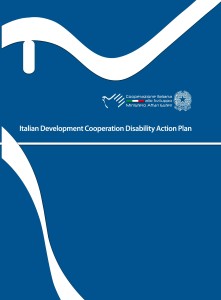Italy’s Action Plan on Disability: a tool for inclusion in Development Cooperation
 On October 30th, the Deputy Minister for Foreign Affairs Lapo Pistelli, the Director General of the Italian Cooperation Giampaolo Cantini, gathered for a press conference to officially launch the Italian Development Cooperation disability action plan.
On October 30th, the Deputy Minister for Foreign Affairs Lapo Pistelli, the Director General of the Italian Cooperation Giampaolo Cantini, gathered for a press conference to officially launch the Italian Development Cooperation disability action plan.
Notwithstanding the fact that Italy’s aid policies inclusive of disability have been in time progressively structured, to the extent that in 2010 the Guidelines on disability were formally adopted, this important document marks an additional step forward for Italy’s development cooperation policies.
Mr. Pistelli stressed the importance of the participatory approach that has seen the MFA ” almost as a facilitator ” and that will now have to carry out the task to substantiate what is written in the document, identifying information, awareness raising and mapping and data collection the priority issues of the Action Plan. A first step towards the development of projects in this area has been done, as pointed out by Mr. Cantini, with the approval of 7 projects that target disability, for a contribution of more than 50 million Euros. He also pointed out that the hoped for increase in the resources available from the stability law, now under discussion, would confirm the Mediterranean and the Middle East as Italy’s priority geographical areas.
Mr. Giampiero Griffo (DPI Italy ) pointed out that this document fully complies with the requirements for the implementation of the UN Convention on the Rights of Persons with Disabilities, and in particular Articles 11 (Situations of risk and humanitarian emergencies) and 32 (International cooperation), valuing the work done as an appropriate practice of participation, producing a pragmatic instrument. The Italian Network of Disability and Development (RIDS), said Ms. Francesca Ortali (AIFO), represents an important added value both in the cooperation and the disability fields as it was created specifically to connect and share competencies with the aim of promoting partnerships in Italy and abroad. Focusing on the benefits of synergies, Mr. Alfredo Camerini (EducAid ) highlights the important heritage in the field of educational and social inclusion that RISD is contributing to share for the benefit of all. Finally, the Action Plan, stresses Mr. Pietro Barbieri (FISH), has basically already become an operational tool for the implementation of the Biennial Programme of Action on Disability “Biennial action plan for the promotion of the rights and the integration of persons with disabilities”, adopted by the Ministry of Labor and Social Policies, where there is a specific line devoted to development cooperation based on the Plan of Action. In support of what has been previously stated by the Ministry in terms of commitment, Ms. Mina Lomuscio, reference person of the MFA-RIDS Panel, announced the launch of training activities – starting from various MFA-DGCS offices and the Central Technical Unit -, awareness-raising, mapping and data collection, and the constitution of start of technical committees on specific issues such as, for example, emergency and accessibility.
The document was drafted in the first instance by the members of the MFA-RIDS Panel and was further enriched with contributions from the active participation of 50 institutions, associations, local authorities, universities, research centers and businesses, gathered in 4 working groups, so as to produce a concrete and accurate text.
The text is divided into 5 chapters that cover as many areas of action. These are essential to build a comprehensive system of inclusion of disability based on a twin-track approach: implement initiatives specifically targeting persons with disabilities through empowerment and a participatory approach and, on the other hand favor the inclusion of disability among all projects’ targets.
Policies and strategies
The key words in this chapter are mainstreaming and monitoring. On the one hand it is necessary that the disability perspective is included in the definition of all policies and strategies, even those that do not concern disability directly – that is to say, for example, those of gender, childhood and adolescence, environment, poverty etc. -, from the design phase through implementation, monitoring and evaluation. On the other it is important to develop a system to collect qualitative data that allows the evaluation of cooperation activities implemented by the Ministry of Foreign Affairs (either directly or through the financing of projects entrusted to bodies and NGOs) from all stakeholders active in the field of cooperation.
Inclusive project planning & design
This chapter lists the actions that would ensure the development of appropriate skills that would know, that is, how to include disability in the various contexts in which they operate, while maintaining the connection with international standards outlined, in the first place, by the UN Convention on the Rights of Persons with disabilities. Furthermore, recognizing that sustainability of the Convention can be granted only with the empowerment of organizations of persons with disabilities, emphasis is placed on the introduction of capacity building activities in cooperation projects. In this context, the recognition of the Italian approach to inclusive education, aims to support the participation of persons with disabilities in cultural life, recreation, leisure and sport.
Accessible and usable environments, goods and services
The actions foreseen in this chapter focus on the elimination of those barriers, not only architectural, which prevent persons with disabilities to actually access and benefit of spaces, opportunities, rights and services that are made available to the general population. It also discusses the accessibility of infrastructures, starting from those of the Ministry itself in Italy and abroad and the new constructions as well as accessibility and usability of internet sites, transport and job placements services.
Humanitarian aid and emergency situations including persons with disabilities
Here the document highlights the change that we have been witnessing in recent years that has seen the disability becoming one of the priority targets when researching for risk reduction solutions in humanitarian and emergency situations and natural and human disasters such as wars. On one hand it hinges on the innovative (but still not much known) concept of reasonable accommodation, on the other it highlights the importance of adequate training of personnel with the direct involvement of persons with disabilities and their organizations, whom can ensure, through their direct experience, the necessary know-how.
Leveraging the skills and expertise of civil society and companies
The realities that make up the Italian system, that is civil society and firms, play the central part of this chapter. The role they have in developing capacities and to systematize legislation and appropriate practices is highlighted, knowing that their development and networking allows to guarantee the applicability of policies. At the same time it is important to know how to share these skills to development cooperation countries, with full respect for local ownership.
Thus, the common goal of the Ministry and civil society, is that also through the Action Plan, disability becomes a so-called “cross cutting issue”, a theme that cuts across all policies and programs of cooperation.
(Rids)
download the Italian Development Cooperation Disability Action Plan
Via G.Cerbara 20
00132 Roma (RM)
CF: 97891900587
La Rete Italiana Disabilità e Sviluppo (RIDS), si è costituita per valorizzare un patrimonio di esperienze e progetti che mettono al primo posto il rispetto dei diritti umani delle persone con disabilità
alleanza strategica
attenzione ai diritti delle persone
inclusione
empowerment
LA RETE

NEWSLETTER
© Copyright 2020 ridsnetwork.org - Privacy Policy | Cookie Policy






